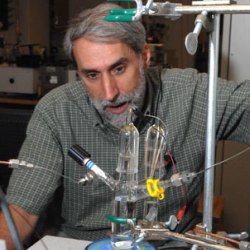Source: MIT
MIT researchers have developed an inexpensive and efficient solution for storing solar energy. A catalysis process that opens up new perspectives for the development of renewable energies.
The multiple attempts to store energy from the sun in order to reuse it later have always encountered the obstacle of cost and efficiency of the processes.
This, until researchers at MIT offer a solution that is both effective, inexpensive, and very simple to implement. And which uses only abundant and non-toxic raw materials.
"Solar energy has always been a little distant, limited solution, explains Professor Nocera. Now we can seriously think about unlimited solar energy, and soon."
His team has developed a process inspired by plant photosynthesis, which uses energy from the sun to break down water into hydrogen and oxygen. The gases can then be recombined via a fuel cell and supply energy to a house or an electric car regardless of the amount of sunshine.
The key to this new process is a new catalyst that produces oxygen from water. When current flows through the electrode, its cobalt and phosphate form a thin film, and oxygen is produced there.
It is combined with another catalyst (kept secret?) Which produces hydrogen.
The new catalyst operates at room temperature, neutral pH, and is easy to use. "That's why I know it's going to work, Nocera predicts. It's so easy to set up."
"This is a major discovery with enormous consequences for the future prosperity of mankind, commented Professor Barber of Imperial College London." The importance of their discovery cannot be underestimated, insists. he says, because it opens the door to the development of new technologies for energy production, making it possible to reduce our dependence on fossil fuels and to respond to the problems of climate change. "
Nocera hopes that within 10 years, homeowners will be able to power their homes by day with photovoltaic cells, while using excess solar energy to produce hydrogen and oxygen and continue to grow. light up the rest of the time.
Some analyzes:
- The H2 catalyst is kept secret, one wonders why ... it wouldn't be cerine by any chance?
+ Hydrolysis with PV panels is a big deal of bullshit (15% against 60% with the solar concentration)
+ JL Perrier therefore undoubtedly had better results in terms of yield ... without the millions of dollars in R&D aid: https://www.econologie.com/forums/solaire-je ... t1520.html
+ It's not in 10 years but NOW we need a solution
+ What to do with the H2 product AFTER?
= Another stroke of the sword in the water ...
Sorry but currently and for a long time yet, nothing beats a GOOD BIG THERMAL BUFFER for storing solar energy:
- https://www.econologie.com/forums/une-maison ... t5233.html
- https://www.econologie.com/maison-solair ... -3790.html
- And ours: https://www.econologie.com/forums/energie-so ... t4517.html


